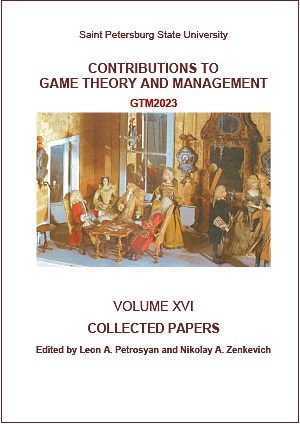Dependent Retailers' Demand in Game Theoretic Model of Supply Chain
Abstract
Supply chain management is one of the intensively developing areas of applied research. One of the main tools for studying the problems of this area is game theory. This study is based on a two-level supply chain model mathematically described using a hierarchical Stackelberg game. The top player in the hierarchy is the manufacturer and the bottom players are two retailers interacting according to the Cournot game scheme. Unlike previous models, this one assumes that their demands are dependent and jointly distributed. Next, the focus shifts to the study of the interaction pattern of retailers when trading substitute goods. A special case of joint distribution of demand is considered.
Keywords:
two-echelon supply chain, Stackelberg game, Cournot game, dependent demand, joint distribution, substitutable demand, Nash equilibrium
Downloads
References
Bonci, A., Pirani, M. and Longhi, S. (2017). An Embedded Database Technology Perspective in Cyber-Physical Production Systems. Procedia Manufacturing, 11, 830–837.
Borovkov, A. A. (2009). Probability Theory. Moscow: Editorial URSS (in Russian).
Cachon, G. and Netessine, S. (2004). Game Theory in Supply Chain Analysis. In: SimchiLevi, D. and Wu, S. and Shen, Z. (Eds.) Handbook of Quantitative Supply Chain Analysis: Modeling in the E-Business Era. Kluwer, Boston.
Dai, Y., Chao, X., Fang, S. and Nuttle, H. (2005). Game Theoretic Analysis of a Distribution System with Customer Market Search. Ann. Oper. Res., 135, 223–238.
Dekking, F. M., Kraaikamp, C., Lopuhaa, H. P. and Meester, L. E. (2005). A Modern Introduction to Probability and Statistics: Understanding Why and How. Springer-Verlag London Limited.
Ghiami, Y. and Williams, T. (2015). A Two-echelon Production-inventory Model for Deteriorating Items with Multiple Buyers. Int. J. Prod. Econ., 159, 233–240.
Goldenock, E. and Goldenock, K. (2008). Eventological measurement of superposition demand and supply by distributional functions. Journ. SFU. Ser. Matem. i Phys., 1(1), 78–84 (in Russian).
Hennetx, J. C. and Ardax, Y. (2008). Supply Chain Coordination: A Game Theory Approach. Engineering Applications of Artificial Intelligence, 21(3) , 399–405.
Kherbach, O. and Mocan, M. L. (2016). The Importance of Logistics and Supply Chain Management in the Enhancement of Romanian SMEs. Procedia – Social and Behavioral Sciences, 221, 405–413.
Kumacheva, S. and Zakharov, V. (2022). Two Echelon Supply Chain: Market Search Behavior and Dependent Demands. In: Smirnov, N. and Golovkina, A. (Eds.) Lecture Notes in Control and Information Sciences – Proceedings. Stability and Control Processes. SCP 2020. Springer, Cham., pp. 419–426.
Kumara, V., Chibuzob, E. N., Garza-Reyesc, J. A., Kumaria, A., Rocha-Lonad, L. and Lopez-Torrese, G. C. (2017). The Impact of Supply Chain Integration on Performance: Evidence from the UK Food Sector. Procedia Manufacturing, 11, 814–821.
Kuchesfehani, E. K., Parilina, E. M. and Zaccour, G. (2022). Revenue and cost sharing contract in a dynamic closed-loop supply chain with uncertain parameters. Annals of Operations Research. https://doi.org/10.1007/s10479-022-05055-x
Martagan, T. G. (2010). Game theoretic analysis of an inventory problem with substitution, random demand and yield. Theses and Dissertations, 2369.
McConnell, C. R. and Brue, C. R. (1990). Economics: Principles, problems and policies. New York, 399.
Parlar, M. (1988). Game Theoretic Analysis of the Substitutable Product Inventory Problem with Random Demands. Nav. Res. Logist., 35, 397–409.
Pechersky, S. L. and Belyaeva, A. A. (2001). Game Theory for Economists. St. Petersburg: Europian University (in Russian).
Sharma, A., Dwivedi, G. and Singh, A. (2019). Game-theoretic Analysis of a Two-echelon Supply Chain with Option Contract Under Fairness Concerns. Computers and Industrial Engineering Volume,137, 106096, doi: https://doi.org/10.1016/j.cie.2019.106096
Sukati, I., Hamid, A. B., Rohaizat, B. and Yusoff, R. Md. (2012). The Study of Supply Chain Management Strategy and Practices on Supply Chain Performance. Procedia – Social and Behavioral Sciences, 40, 225–233.
Tirole, J. (1988). The Theory of Industrial Organization. MA: MIT Press, Cambridge.
Yao, Z., Leung, S. C. H. and Lai, K. K. (2008). Manufacturer's Revenue-sharing Contract and Retail Competition. European Journal of Operational Research, 186, 637–651.
Yao, F., Parilina, E. and Zaccour, G. (2022). Accounting for consumers' environmental concern in supply chain contracts. European Journal of Operational Research, 301, 987–1006.
Yuqing, Qi., Weihong, Ni. and Kuiran, Shi. (2015). Game Theoretic Analysis of One Manufacturer Two Retailer Supply Chain With Customer Market Search. Int. J. Production Economics, 164, 57–64.
Downloads
Published
How to Cite
Issue
Section
License
Articles of "Contributions to Game Theory and Management" are open access distributed under the terms of the License Agreement with Saint Petersburg State University, which permits to the authors unrestricted distribution and self-archiving free of charge.




